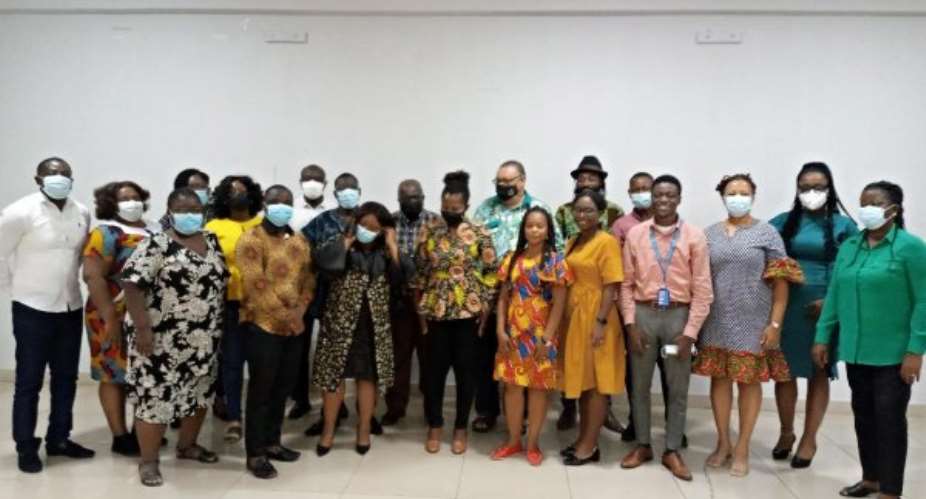A research on Additional Burden on COVID-19 Disposable Facemasks to Ghana's Plastic Management has shown that facemasks have taken over plastic waste at four beaches sampled in Accra.
The Institute for Environment and Sanitation Studies (IESS) of the University of Ghana, Legon, is carrying out the project, with funding from the United Nations Development Programme (UNDP).
The beaches sampled are Kpeshie, Art Centre, Sakumono and Krokrobite in the Greater Accra Region.
The study also revealed that people are disposing of facemasks indiscriminately, resulting in huge heaps of waste along the beaches.
Dr Edem Mahu, a Senior Lecturer at the Marine and Fishery Science Department of the University of Ghana, presenting a paper on; "PPE and Microplastics in the Coastal Environment," said the study is work in progress.
She said the research is to have photo inventory of the microplastics, identify the polymer types to propose management actions.
Dr Mahu said the Kpeshie beach recorded the highest number of plastic wastes, while the Art Centre beach recorded the highest PPE waste.
She said the PPE, mostly single used facemasks, could breakdown into microplastic that were the most pollutant at the coast.
Dr Mahu explained that microplastics were tiny debris and the fishes easily ingest a large number of them due to their sizes.
She, therefore, suggested the adoption of reusable facemasks that conformed to international standards to help address pollution at the beaches.
Dr Catherine Adodoadjie-Dogbe, the Assistant Programme Officer, UNDP, speaking on the: "Current State of Knowledge" said there is high compliance among drivers, especially the older ones, with usage of facemasks.
She said though there were no further literature on why the high compliance, it could be attributed to the assertion that older people with underlying health conditions were more prone to the Covid-19 pandemic.
Dr Ama Kwansima Essel, a Public Health Consultant, touching on: "Use and Misuse of Masks- Implication for Public Health," which is also work in progress, said: "The COVID-19 is here with us and it is important to use the appropriate type of mask to curb the pandemic".
She said about half of the people interviewed were not wearing face masks and the other half that were wearing it too, about 31 per cent per cent were not wearing it properly.
She stressed the need to bring the media on board in educating the public on the proper use of facemasks.
Professor Chris Gordon, the Project Team Lead, said it would be beneficial to the country to encourage the use of the biodegradable (cloth) masks, which were cost effective and safe.
He called for coordinated response from all stakeholders to address the pandemic, adding; “The way the COVID is behaving, we may be celebrating Christmas in masks for the next five years."
GNA





 It’s an abuse of power to arrest ECG officials for performing legitimate duties ...
It’s an abuse of power to arrest ECG officials for performing legitimate duties ...
 Unreasonable Actions of GTEC to Collapse Private Universities, Colleges, Institu...
Unreasonable Actions of GTEC to Collapse Private Universities, Colleges, Institu...
 Corruption makes a lot of people rich, happy; NDC, NPP cannot help us – Okyeame ...
Corruption makes a lot of people rich, happy; NDC, NPP cannot help us – Okyeame ...
 GOIL increases fuel prices again, diesel sells GHC14.80, GHC14.99 per litre of p...
GOIL increases fuel prices again, diesel sells GHC14.80, GHC14.99 per litre of p...
 Bawumia will use Ghana’s gold to stabilize the Cedi if voted as President — Ahia...
Bawumia will use Ghana’s gold to stabilize the Cedi if voted as President — Ahia...
 Arrival of state-of-the-art bullet trains signify Ghana’s journey towards enhanc...
Arrival of state-of-the-art bullet trains signify Ghana’s journey towards enhanc...
 Idea behind Performance Tracker is great but shouldn't be limited to election ye...
Idea behind Performance Tracker is great but shouldn't be limited to election ye...
 Election 2024: Bawumia losing 21.8% of NPP’s 2020 Akan votes — Global InfoAnalyt...
Election 2024: Bawumia losing 21.8% of NPP’s 2020 Akan votes — Global InfoAnalyt...
 People are celebrating their 80th birthday and Ghana owes GHS650 billion; who is...
People are celebrating their 80th birthday and Ghana owes GHS650 billion; who is...
 Court issues arrest warrant for Chinese Iron woman, one other over cantonments l...
Court issues arrest warrant for Chinese Iron woman, one other over cantonments l...
